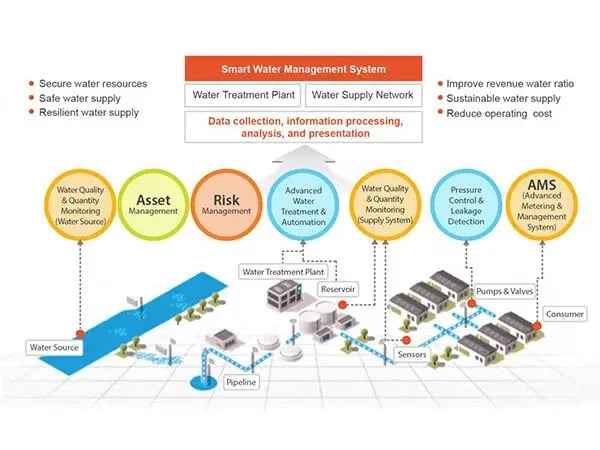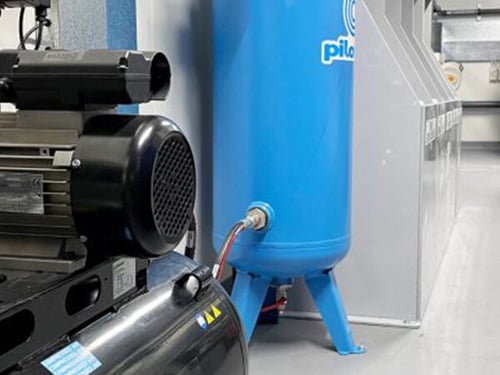Smart water management is an innovative approach that integrates advanced technologies to manage and optimize the use of water resources. In a global context facing clean water availability challenges, this approach becomes crucial to ensure sustainability and efficiency.
In Indonesia, where water resources are facing pressure from population growth and climate change, smart water management offers solutions capable of addressing a range of environmental concerns as well as supporting sustainable economic development. These technologies not only help in monitoring and controlling water usage but also in detecting leaks and reducing wastage.

History and Development of Water Management Technology
Since ancient times, humans have sought to manage water resources through various traditional methods. From the construction of dams to irrigation channels, these efforts have evolved over time. Entering the modern era, digital technology began to be integrated in water management systems. Sensors, satellite monitoring, and geographic information systems are some examples of technologies that have changed the way we manage water resources.
Recent developments in water management technology include the use of artificial intelligence and big data for more accurate analysis and decision-making. These technologies allow relevant authorities to respond quickly to changes in water resource conditions and implement more effective strategies in water management. In Indonesia, the integration of these technologies is still in its infancy, but their potential in supporting smart water management policies is huge.
This long history shows that the role of technology in water management has evolved from highly manual methods to highly automated and data-driven solutions. Moreover, with advances in wireless communication and the IoT (Internet of Things), water management systems can now be more integrated, providing real-time data that allows for more adaptive and responsive management. The implementation of automation systems that use predictive algorithms now allows for early detection of problems such as leaks or pollution, ensuring that action can be taken before the problem develops into a more serious crisis.
With the continued implementation of these technological innovations, water management systems can now be more integrated, providing real-time data that allows for more adaptive and responsive management.
By continuously implementing these technological innovations, water management not only becomes more efficient but also more environmentally friendly, helping to maintain the balance of natural ecosystems and supporting the long-term sustainability of water resources.

Main Components in a Smart Water Management System
The main components of a smart water management system include sensors that measure water content in real-time, an automated control system, and a data analysis platform. Sensors installed at various key points can provide up-to-date data on water conditions such as level, quality, and flow rate. The automated control system utilizes the data from the sensors to regulate water flow and equipment operation more efficiently.
The data analysis platform plays a key role.
The data analysis platform plays a key role in interpreting the information collected. Using artificial intelligence, the system can predict water consumption patterns and potential problems in the system. This helps in better planning and decision-making, thus maximizing efficiency and reducing wastage.
In addition, these systems are often equipped with user interfaces that allow facility managers and local authorities to access and monitor the condition of water sources intuitively and effectively. These interfaces can be digital dashboards that provide real-time data visualization and analytics tools that can quickly identify trends and anomalies. IoT connectivity also allows these systems to communicate with other devices and thus automate the decision-making process based on pre-set parameters.
Additionally, in the context of energy saving and sustainable resource management, many intelligent water management systems now include power management technologies that can optimize energy use in water treatment and distribution facilities. This not only reduces operational costs but also reduces the carbon footprint of water management operations, supporting broader environmental sustainability efforts.

Benefits of Smart Water Management
The benefits of smart water management are significant. First, it improves water use efficiency through better control and reduction in water loss. Second, this technology helps in maintaining water quality, which is important for public health and environmental sustainability. Third, by reducing wastage and improving resource management, operational costs can be significantly reduced.
In an environmental context, smart water management can reduce the negative impacts on ecosystems due to ineffective water management. By monitoring and managing water resources more efficiently, we can reduce water pollution, control flooding, and keep local ecosystems stable.
In addition, the adoption of smart water management can reduce the negative impacts on ecosystems.
In addition, the adoption of smart water management systems supports sustainability initiatives by empowering communities to participate in the management of their own resources. These technologies allow for greater data transparency, which promotes public responsibility and participation in water resource management. On the other hand, in crisis situations-such as droughts or severe floods, smart systems can provide the data needed for a quick and effective response, allowing authorities and communities to act before conditions worsen.
Finally, by using the predictive and adaptive tools provided by smart water management, governments and organizations can plan further for the future, better prepare for climate change and increase resilience to unexpected environmental events. The combination of improved water quality, resource efficiency and community participation creates a virtuous circle that strengthens sustainability initiatives across multiple sectors.

Challenges in Implementing Smart Water Management in Indonesia
The implementation of smart water management in Indonesia faces several challenges. First, the limited infrastructure that supports modern technology can hinder the widespread implementation of these systems. Second, high implementation costs are often prohibitive for local governments and the private sector. Third, there is a need for government policies that support innovation and investment in smart water management technologies.
For example, according to a study published by the World Bank, existing infrastructure in many parts of Indonesia is still inadequate to support the full integration of smart water management technologies. This includes limitations in pipeline capacity, treatment systems, and accessibility of advanced monitoring technologies. Furthermore, the World Bank also notes that investments in the water sector are often insufficient to address immediate needs, let alone for innovative projects that require greater upfront costs.
Despite the challenges, strategic steps can be taken to overcome these barriers. Increased investment in research and development, as well as cooperation between government, academia and the private sector, are key to advancing smart water management in Indonesia. International cooperation, such as that which has been initiated with several global donor and development agencies, can also strengthen national efforts in building capacity and adopting the latest technologies.
With a more coordinated approach to water management in Indonesia, more strategic steps can be taken.
With a more coordinated approach and stronger policy support, Indonesia can overcome these challenges and implement effective smart water management solutions to support sustainable development and environmental sustainability.

Smart water management represents a crucial transformation in water resources management through the integration of advanced technologies. From automated control systems to the use of sensors and data analysis platforms that use artificial intelligence, these technologies enable more efficient and effective water management. In Indonesia, amid challenges such as population growth and climate change, smart water management offers solutions that not only support sustainable economic development but also protect the environment.
The history of water management shows an evolution from traditional manual methods towards more automated and data-driven solutions, utilizing advances in IoT and wireless communication for a more adaptive response to water management needs. With this, there can be significant improvements in resource use efficiency, reductions in water loss, and improvements in water quality.
However, the implementation of these technologies in the water sector has been limited.
Overall, smart water management not only strengthens environmental sustainability but also enables communities and governments to better respond to water crises, support sustainability initiatives, and prepare for a better future through more thoughtful and responsible resource management. This creates a virtuous circle that strengthens sustainability initiatives and develops adaptive capacity to ongoing global environmental change.
